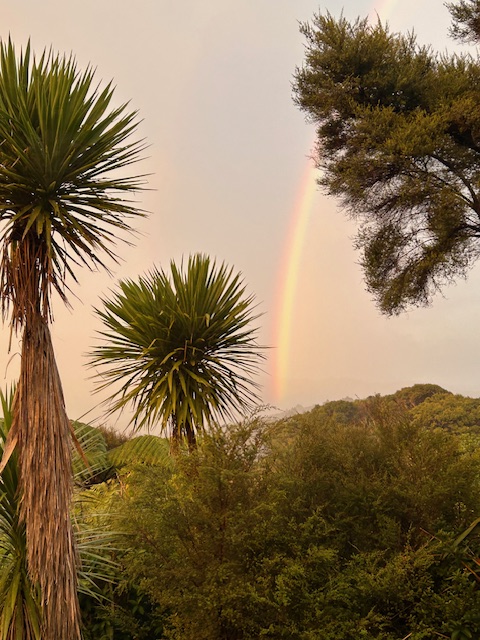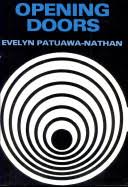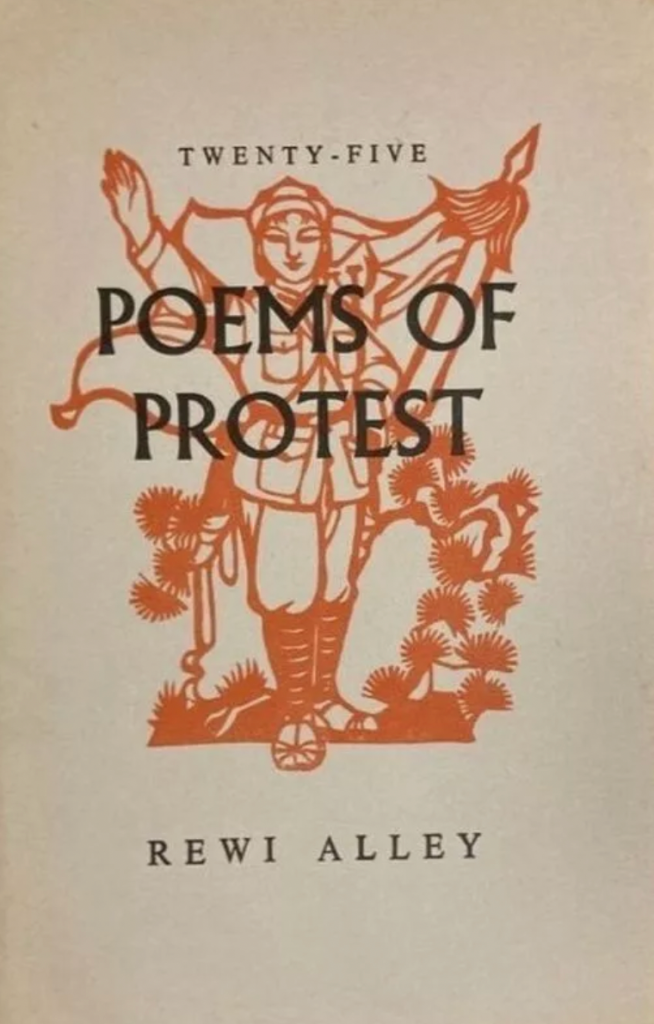Ah. What pleasure it was this week assembling a feature to celebrate Katūīvei: Contemporary Pasifika Poetry from Aotearoa New Zealand, edited by David Eggleton, Vaughan Rapatahana and Mere Taito (Massey University Press). Listening to the audios, reading the conversation the editors contributed to, it was skin-pricklingly good. Inspiring.
I also listened to a terrific conversation that originally aired on RNZ National in 2010 as part of the ‘Books that Built New Zealand’ series. Justin Gregory asked academic Dr Alice Te Punga-Somerville: how can a book that was never published, and never read, tell us about who we are? In my research for Wild Honey, I had come across the author of the missing novel, Evelyn Patuawa-Nathan. She had published a collection of poetry, Opening Doors. I went back to my copy of Wild Honey and reread what I had written. I would love to give a few signed copies away (message me or email paulajoygreen@gmail.com), but here is an extract:
Patuawa-Nathan grew up in Maropiu, Northland. When she was twelve, she left home and worked in hospitals, hotels and factories. Twenty years before her debut and, to my knowledge, only poetry collection, she wrote a novel that Collins in London was keen to publish, but the edited manuscript got lost in the post and she abandoned it. With poet Hone Tuwhare and author Harry Dansey, she tried unsuccessfully to establish a society for Māori writers. After periods abroad, she moved to Sydney permanently, where she taught in a private school and worked with women prisoners, and apparently wrote under another name. I find scant mention of her in New Zealand archives, have a single book of her poetry, and her poetic melodies cling to me. Like so many other women writers, she is a puzzling gap.
Patuawa-Nathan’s poetry, moving with grace and exquisite economy, reveals a formidable attachment to home. Like Vernice Wineera, her poetic return to origins, throughout the collection, resembles a tidal movement that both reveals and conceals: a return to her village and valley, with its summer hues, ‘holds aloft scarlet-tipped fingers/ halting the hours/ so I may know again/ this hesitant valley of my birth’.[i] In ‘Distant Village’, separation is an ache-channel across the Tasman Sea that poetry fertilises with poignant detail, with little repetitions like the breath of the wind returning: ‘Distant village/ your essence reaches me/ from the broad hill sounds/ hung over northern valleys.’[ii] But the detail carried on the breath of the wind, like the detail carried on the force of the line, is surrogate, a pale substitute where words grapple to hold the physical anchors of home. As readers we are left with a melancholic trace: ‘You reach me/ touch me/ find I am of stone.’[iii]
Many of Patuawa-Nathan’s poems are evocative postcards on the surface, but as you delve deeper, and like the kumara she references, tendrils of ideas stretch and search: this is who am I, this is where I am from. In ‘Waikato Lament’, the poet calls upon repressed stories that need to be told, in melodious lines that counterpoint the ghostly violence, the damaged people, the smothered and unjust events: ‘Green wandering fingers/ of kikuyu/ prying into an old kumara pit/ playing over limestone belly/ and naked rock/ have not quite covered,/ cannot hide,/ the faded emblems/ of a land lost people.’[iv] The poet stitches the essential heart-hit of narrative into her poem, and the legacy of oppression that she carries along her ancestral bloodline, as she sings:
Blood soaked, in time’s
memory,
spirits of Taupiri
raise keening voices
anthem of injustice
echoing down
through the night.[v]
On other occasions, the injustice is made bitingly, and sometimes sardonically, clear. In ‘Aboriginal on the Last Train Home’, a tiny anecdote harbours the greater, national injustice. The Government pays for an Aborigine’s train ticket back home to the mission. Patuawa-Nathan turns it into wry and caustic joke: ‘Another ten such years of travel/ and they would have paid him a fair price/ for New South Wales.’[vi] In ‘Education Week’, a group of students are taken to visit the local jail, and in that moment of checking, a prescient mirror glass suggests social injustice infects both education and crime statistics: ‘In a small concrete cell/ bare/ but for the humour/ of wall graffiti,/ they reach among comments/ for names of cousins/ and brothers/ and fathers.’[vii]
The blurb of Opening Doors, suggested Patuawa-Nathan had a new collection for publication in Sydney, but sadly, I can find no trace of it; sadly, because her slender debut of 24 poems signalled a poet to savour and invite more from. Her succulent detail coupled with crafted melodies forms a way of anchoring home, and in that anchorage, the poems shelter strong opinions, reclaimed history and familial connections. In the final poem, ‘Taraire Berries’, with te reo words italicised, the words form a skinny spine on the page, akin to a family back bone.[viii] The music resonates on the tongue, sibilant sounds brush against sharper consonants, single-syllable words are adjacent to longer word-notes. Visually the effect is equally sumptuous:
Blue-black
taraire berries
tart on the tongue.
Bush tracks
sun-dried and hoof-worn
to powdery earth
by grazing cattle.[ix]
The poet’s harmonies echo the way home dreams down through her writing pen, just as she passes memory and dream to her son: ‘Memory/ dreams down/ through a son/ seeking his mother’s country./ Seeking the taraire,/ the titoki and karaka.’
[i] Evelyn Patuawa-Nathan, ‘Summer in the Kaihu Valley’, Opening Doors, 1.
[ii] Evelyn Patuawa-Nathan, ‘Distant Village’, Opening Doors, 2.
[iii] ‘Distant Village’, Opening Doors, 2.
[iv] Evelyn Patuawa-Nathan, ‘Waikato Lament’, Opening Doors, 8.
[v] ‘Waikato Lament’, Opening Doors, 8.
[vi] Evelyn Patuawa-Nathan, ‘Aboriginal on the Last Train Home’, Opening Doors, 19.
[vii] Evelyn Patuawa-Nathan, ‘Education Week’, Opening Doors, 23.
[viii]Evelyn Patuawa-Nathan, ‘Taraire Berries’, Opening Doors, 27.
[ix] Taraire Berries’, Opening Doors, 27.
New books in the post this week: Landfall 247, edited by Lynley Edmeades. Slow Fires: New Poems by Leonard Lambert, Cold Hub Press.
Weekly links
Monday Poem: Elizabeth Morton’s ‘Maybes‘
Tuesday: Jenny Powell reads two poems
An Auckland Writers Festival collage
Wednesday: 5 Questions Rhys Feeney
Thursday: Jack Ross on ‘In Levin’ by Therese LLoyd
Friday: Katūīvei – Contemporary Pasifika Poetry from Aotearoa New Zealand
a review, readings, a conversation
A poem
This week I have devoted large chunks of time to reading the poetry collections by Vincent O’Sullivan on my shelves in preparation for next Friday’s tribute. I also found a few more in second-hand bookshops. I think I might do more of this second-hand book shop trawling for poetry! I spotted Twenty-Five Poems of Protest by Rewi Alley (Caxton Press, 1968) in Jason’s Books and nabbed the copy. Such a spiky book to read now, when all these decades later, there is still so much to protest about. Rewi protested the inhumanity of the war in Vietnam. You can feel his rage, his helplessness and his need to speak out. In his introduction, Gordon McArthur writes: “One of the poems is about love, a love that goes deep and selfless and does not slam the gate on outsiders, or forget the loved flesh littering Vietnam fields. Hard to take, rough, brutal and honest. You may not like the bitter medicine; but for some of us, these poems of protest are an alarm that rings in the sleeping conscience. This is the time to be awake.”
Rewi writes in his preface: “If these lines that have been written can do a ploughing job so that the seeds of understanding can be sown, if they can stir some hearts and minds to see reality as it is, and too, if they can help some hands to action, they will have been worthwhile.”
ON LOVE . . .
Love makes a man dare to fight—
Love for the many looted of so much love.
Yet love can grip a man
so that he turns deaf ears
to the cries of Vietnam children burnt,
while thinking only of his own,
his precious ones, slamming the gate
on all outsiders.
A queer thing, this love!
Love for the good woman who is
all good things brought together.
Love for a whole world of lovely things:
white seagulls over blue seas, children
under apple trees, or swimming
in the river.
The love of the close-knit family living as part of one another—
the perfect mother, the understanding friend.
All these are loved as part of living.
But what of the world of the denied,
where anxious children watch each morsel others eat?
The two thirds of the world where sickness
strikes the helpless—where practical and down to earth love
is the crying need?
All must join together in their basic cause
and fight, or be enslaved for long to come.
So easy to prate of love, the magic of her touch—
life taking on new meaning, and all the happy things of love!
But remember too
that loved flesh littering Vietnam fields,
scattered there by
enemies of all good men.
Rewi Alley, Peking, June 24th 1967




arohanui ❤
LikeLike